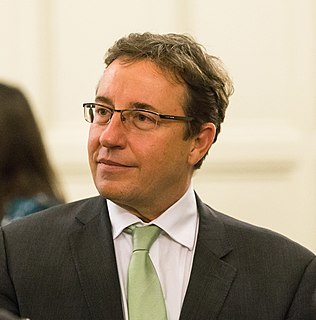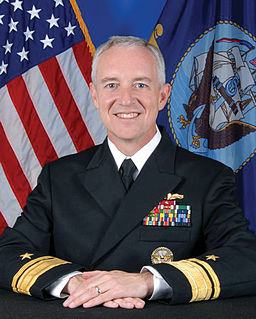A Quote by Nicholas Stern
Climate change is a result of the greatest market failure the world has seen...We risk damages on a scale larger than the two world wars of the last century.
Related Quotes
First, climate change is the greatest long-term threat faced by humanity. It could cause more human and financial suffering than the two world wars and the great depression put together. All countries will be affected, but the poorest countries will be hit hardest. Secondly, the costs of inaction far outweigh the costs of action.
Many scales of climate change are in fact natural, from the slow tectonic scale, to the fast changes embedded within glacial and interglacial times, to the even more dramatic changes that characterize a switch from glacial to interglacial. So why worry about global warming, which is just one more scale of climate change? The problem is that global warming is essentially off the scale of normal in two ways: the rate at which this climate change is taking place, and how different the "new" climate is compared to what came before.
With Climate Change as a Security Risk, WBGU has compiled a flagship report on an issue that quite rightly is rising rapidly up the international political agenda. The authors pull no punches on the likelihood of increasing tensions and conflicts in a climatically constrained world and spotlight places where possible conflicts may flare up in the 21st century unless climate change is checked. The report makes it clear that climate policy is preventative security policy.
...the world needs to face up to the challenge of climate change, and to do so now. It is clear that climate change poses an urgent challenge, not only a challenge that threatens the environment but also international peace and security, prosperity and development. And as the Stern report showed, the economic effects of climate change on this scale cannot be ignored, but the costs can be limited if we act early
I think the challenge of climate change in particular is the challenge for us to create and produce new norms for a new kind of world. And that's why I think as important as the issue of climate change is, it's even more important than it seems because if we can't evolve very quickly, new norms to deal with issues like climate change, we're not going to be able to survive in the kind of world we've created. So I think, really, the whole nature of democracy, of governance, of global community and of solving the kinds of problems of the 21st Century are really at stake.
Now it is the least developed world who are not responsible for this climate change phenomenon that bore the brunt of climate change consequences so it is morally and politically correct that the developed world who made this climate change be responsible by providing financial support and technological support to these people.
Climate change that is occurring right now is causing so much suffering all around the world. Whether it's adding 30 million people to the "at risk of starvation" list in 2008, whether it's the floods in Pakistan, or entire cultures at risk of disappearing, or desertification in Africa - all these things that are currently being caused by climate change. I think it's something that a lot of people want to figure out: how to make the shift, how to help. It seems like such an overwhelming problem.
There's real economic costs to climate change - So, Superstorm Sandy led to billions of dollars in damages. The fires out in the west, 70 million dollars a day are being spent in fighting fires that have clearly been exacerbated by drought and climate change. So, people have pointed out the true dollars and cents cost of inaction on climate change.



































